


[notify_box font_size=”13px” style=”blue”]
The following positive benefits are with-in the scope of possibility for infants and toddlers when taught in a gentle, gradual, child-paced and baby-friendly curriculum.
Children’s needs and concerns must be respected, while learning in an environment of joy and acceptance, never compromising a baby’s well-being through fear and submission.
Not only can the use of force nullify the following positive benefits, but it can also result in adverse, unintended consequences and side effects. Intensive instruction, pushing a child too fast, too soon, too hard or too long can be detrimental to the child on many levels.
Our goal is to continually lay the most natural and child affirming path for our students today and for future generations. Your patience, sincerity, commitment and ability to “enjoy the moment” in class, will yield big rewards in the long run. See the “Selecting a Baby Friendly Aquatic Program” page to learn how to identify programs that are in tune with the needs and development of the whole child.
[/notify_box]
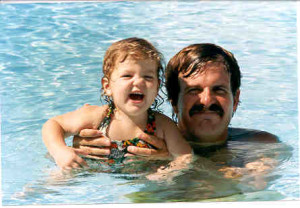 The benefits of “baby-friendly”, infant/toddler swimming are unique, uplifting and contribute to the positive development of the whole child. Through the soothing medium of water, we are able to tap into the child’s potential, both within and without.
The benefits of “baby-friendly”, infant/toddler swimming are unique, uplifting and contribute to the positive development of the whole child. Through the soothing medium of water, we are able to tap into the child’s potential, both within and without.
Researchers have documented that the stimulating effect of child-paced infant/toddler swimming lessons has the potential to increase intelligence, concentration, alertness, and perceptual abilities. Improvement in social, emotional and physical development has also been published. Of course, the manifestation of such inspired cognitive, personal and motor development takes time, patience and repetition. I have personally observed this phenomena and have confirmed this with other veteran instructors, especially in children who started lessons prior to 12 months old, but it’s never too late to receive these unique and subtle benefits of infant-toddler swimming. These babies eventually become extremely peaceful and relaxed in the water.
Water is a forgiving healer, its caressing and stimulating effect on children with special needs is most remarkable. Its buoyancy is like an invisible helping hand. Zero gravity allows for freedoms that do not exist on the dry land. Optimal learning conditions, combined with kindness and patience can even release a withdrawn or hurting child from their shell. Also, over the years, we have discovered that autistic infants, babies, toddlers and tykes and their parents find the nurturing swimming experience to be an engaging, calming and positive tactile environment for developing, interacting and growing together. Much as “floortime” works for children on the autistic spectrum (ASD), so too, early swim lessons taught with toys, games, songs, motion and verbal communication can help stimulate learning interactions.
In what other medium are you able to bond face to face, skin to skin and share the joy of learning together?
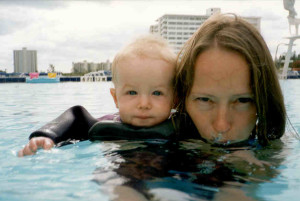
A special time, a special place for you and your child.
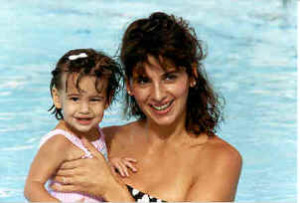 Early swim lessons set a positive foundation towards a lifetime of participation and enjoyment in a variety of water sports and aquatic venues on, in and under the water.
Early swim lessons set a positive foundation towards a lifetime of participation and enjoyment in a variety of water sports and aquatic venues on, in and under the water.
Each class is an interactive recreational activity in a new and exciting liquid environment. “Go Pool” are often among the first words spoken by young “Diaper Dolphins”. Swimming imports great joy into the lives of infants and toddlers. It also fashions healthier and stronger individuals.
This is often a child’s first social experience out of the home that involves their peers. They learn to relate and interact with each other and look forward to seeing their class mates. Caring and patient moms and dads of young children have an ideal opportunity to meet like minded people who share common interests.
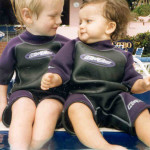
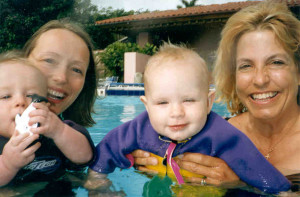
For the right people, in the right situation, baby swimming can nurture a connectedness to family, community and to the outer world.
Safety skills are a primary reason why many people initially enroll in lessons. But, as you now know there is much more to infant/toddler swimming than merely one aspect. However, with the acquisition of safety skills not only is early swimming life enhancing, it can be lifesaving. The younger a child can begin their swimming adventure the sooner they will be able to build a foundation for the eventual ability to perform age appropriate safety skills (never imposing techniques on a child against their will or with the use of force). We must note that it is always the parents’ responsibility to ensure the safety of their children. Swimming safety skills and home pool safety will be discussed on following pages. (i.e.. supervision, barriers, pool safety fencing, CPR and child centered swimming lessons).
The smooth and fluid exercise in the water results in healthier naps following class. Parents attending the evening classes have noted improved sleeping patterns throughout the night. |
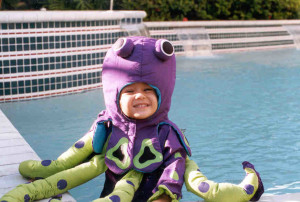
“Hi, I’m Haley. The benefits of infant swimming stretch out in many directions.”
Early swimming fosters a growing sense of self-esteem, confidence and independence. As a child’s ability to freely move through the water increases so does their sense of well-being . Eventually, for those families who persevere, a point is reached where their child truly feels at home in the water and becomes a Diaper Dolphin.
“My happiest time is when I can play in the pool with my mom and dad.”
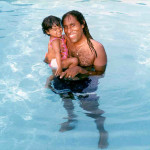
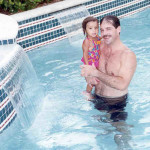
Take it slow, have fun, enjoy the journey, go the distance– the pay off is for life.
Children Who Swim Start Smarter, Study Suggests
Children who learn how to swim at a young age are reaching many developmental milestones earlier than the norm, a new survey suggests. (Credit: © SerrNovik / Fotolia)
ScienceDaily (Nov. 16, 2012) — Children who learn how to swim at a young age are reaching many developmental milestones earlier than the norm.
Researchers from the Griffith Institute for Educational Research surveyed parents of 7000 under-fives from Australia, New Zealand and the US over three years.
A further 180 children aged 3, 4 and 5 years have been involved in intensive testing, making it the world’s most comprehensive study into early-years swimming.
Lead researcher Professor Robyn Jorgensen says the study shows young children who participate in early-years swimming achieve a wide range of skills earlier than the normal population.
“Many of these skills are those that help young children into the transition into formal learning contexts such as pre-school or school.
“The research also found significant differences between the swimming cohort and non-swimmers regardless of socio-economic background.
“While the two higher socio-economic groups performed better than the lower two in testing, the four SES groups all performed better than the normal population.
The researchers also found there were no gender differences between the research cohort and the normal population.
As well as achieving physical milestones faster, children also scored significantly better in visual-motor skills such as cutting paper, colouring in and drawing lines and shapes, and many mathematically-related tasks. Their oral expression was also better as well as in the general areas of literacy and numeracy.
“Many of these skills are highly valuable in other learning environments and will be of considerable benefit for young children as they transition into pre-schools and school.”
The study is a joint project between Griffith University, Kids Alive Swim Program and Swim Australia.
Report: http://www.griffith.edu.au/__data/assets/pdf_file/0019/470251/early-year-swim-interim-report-2012.pdf
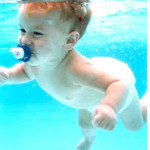 Many students can swim before they can walk. As, their swimming progresses you will witness improved coordination, strength, endurance and lung capacity.
Many students can swim before they can walk. As, their swimming progresses you will witness improved coordination, strength, endurance and lung capacity.